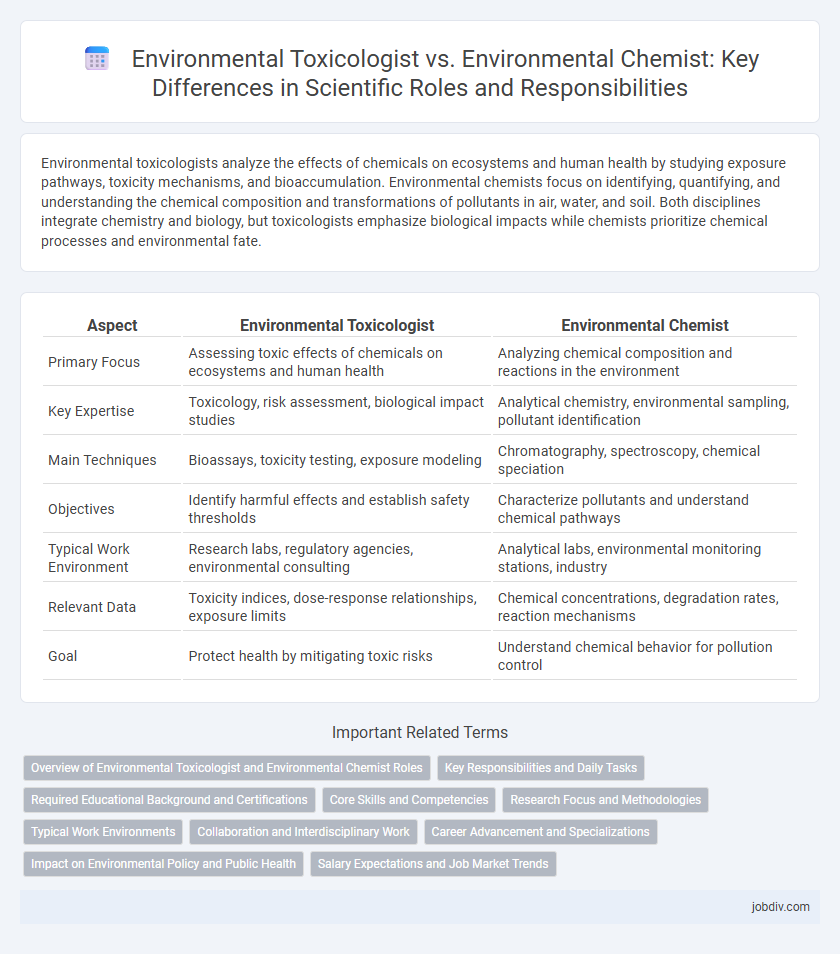Environmental toxicologists analyze the effects of chemicals on ecosystems and human health by studying exposure pathways, toxicity mechanisms, and bioaccumulation. Environmental chemists focus on identifying, quantifying, and understanding the chemical composition and transformations of pollutants in air, water, and soil. Both disciplines integrate chemistry and biology, but toxicologists emphasize biological impacts while chemists prioritize chemical processes and environmental fate.
Table of Comparison
| Aspect | Environmental Toxicologist | Environmental Chemist |
|---|---|---|
| Primary Focus | Assessing toxic effects of chemicals on ecosystems and human health | Analyzing chemical composition and reactions in the environment |
| Key Expertise | Toxicology, risk assessment, biological impact studies | Analytical chemistry, environmental sampling, pollutant identification |
| Main Techniques | Bioassays, toxicity testing, exposure modeling | Chromatography, spectroscopy, chemical speciation |
| Objectives | Identify harmful effects and establish safety thresholds | Characterize pollutants and understand chemical pathways |
| Typical Work Environment | Research labs, regulatory agencies, environmental consulting | Analytical labs, environmental monitoring stations, industry |
| Relevant Data | Toxicity indices, dose-response relationships, exposure limits | Chemical concentrations, degradation rates, reaction mechanisms |
| Goal | Protect health by mitigating toxic risks | Understand chemical behavior for pollution control |
Overview of Environmental Toxicologist and Environmental Chemist Roles
Environmental toxicologists specialize in assessing the effects of chemicals and pollutants on human health and ecosystems by studying toxicity mechanisms and exposure pathways. Environmental chemists focus on identifying, analyzing, and quantifying chemical compounds in air, water, and soil to understand pollution sources and environmental processes. Both roles are essential for environmental protection, with toxicologists emphasizing biological impacts and chemists prioritizing chemical composition and behavior.
Key Responsibilities and Daily Tasks
Environmental toxicologists analyze the effects of chemical pollutants on ecosystems and human health, conducting bioassays and exposure assessments to identify toxic substances. Environmental chemists focus on detecting and quantifying chemical compounds in soil, air, and water through sampling, chemical analysis, and laboratory instrumentation. Both roles collaborate to develop strategies for pollution mitigation and environmental risk management, ensuring compliance with regulatory standards.
Required Educational Background and Certifications
Environmental Toxicologists typically require a master's or doctoral degree in toxicology, environmental science, or related fields, with certifications such as the American Board of Toxicology (ABT) credential enhancing professional credibility. Environmental Chemists usually hold a bachelor's or master's degree in chemistry, environmental chemistry, or biochemistry, with certifications like the American Chemical Society (ACS) Certified Chemist designation supporting expertise. Both professions benefit from specialized training in environmental regulations, risk assessment, and laboratory techniques to address pollution and its impact on ecosystems.
Core Skills and Competencies
Environmental toxicologists specialize in assessing the effects of chemicals on living organisms, emphasizing skills in toxicology, risk assessment, and biological impact analysis. Environmental chemists focus on analyzing chemical compositions and reactions within ecosystems, requiring expertise in analytical chemistry, pollutant detection, and chemical modeling. Both professions demand strong knowledge of environmental regulations, data interpretation, and laboratory techniques, but toxicologists prioritize biological systems while chemists emphasize chemical processes.
Research Focus and Methodologies
Environmental toxicologists primarily investigate the effects of chemical pollutants on living organisms, utilizing bioassays, dose-response studies, and biomarker analysis to assess toxicity and ecological risk. Environmental chemists focus on identifying, quantifying, and characterizing chemical substances in air, water, and soil through analytical techniques such as chromatography, spectroscopy, and mass spectrometry. Both disciplines employ laboratory and field research, but toxicologists emphasize biological impact assessment while chemists concentrate on chemical processes and transformations in the environment.
Typical Work Environments
Environmental toxicologists typically conduct research in laboratories, field sites, and regulatory agencies, focusing on the effects of pollutants on ecosystems and human health. Environmental chemists often work in analytical laboratories, industrial facilities, and environmental monitoring organizations, analyzing chemical compositions of air, water, and soil samples to detect contaminants. Both professions collaborate with environmental agencies and consulting firms to support environmental protection and compliance initiatives.
Collaboration and Interdisciplinary Work
Environmental toxicologists and environmental chemists collaborate closely to assess the impact of chemical pollutants on ecosystems and human health. Their interdisciplinary work combines toxicological data with chemical analysis to identify hazardous substances, understand exposure pathways, and develop mitigation strategies. This synergy enhances environmental monitoring, risk assessment, and regulatory compliance, fostering comprehensive solutions to complex environmental challenges.
Career Advancement and Specializations
Environmental toxicologists advance their careers by specializing in areas such as ecotoxicology, risk assessment, and regulatory toxicology, often working in government agencies, academia, or industry to evaluate chemical impacts on ecosystems and human health. Environmental chemists focus on chemical analysis, pollution control, and the development of sustainable materials, with career progression typically involving roles in research laboratories, environmental consulting firms, and regulatory bodies. Both fields offer specialized certifications and advanced degrees that enhance expertise and open opportunities in interdisciplinary environmental science and policy-making.
Impact on Environmental Policy and Public Health
Environmental toxicologists assess the effects of chemical pollutants on ecosystems and human health, providing critical data that shapes regulatory standards and public health guidelines. Environmental chemists analyze the chemical composition and transformations of pollutants, offering insights into contaminant sources and degradation pathways essential for effective policy formulation. Both disciplines contribute to evidence-based environmental policies that mitigate health risks and promote sustainable ecosystem management.
Salary Expectations and Job Market Trends
Environmental toxicologists typically command higher salary expectations than environmental chemists, with median annual incomes ranging from $70,000 to $95,000 depending on experience and specialization. The job market for environmental toxicologists is expanding due to increased regulatory scrutiny and demand for toxicological risk assessments in industries like pharmaceuticals and agriculture. Environmental chemists face steady demand driven by pollution control and environmental monitoring, with median salaries generally between $60,000 and $85,000, reflecting the sustained need for chemical analysis and remediation expertise.
Environmental Toxicologist vs Environmental Chemist Infographic

 jobdiv.com
jobdiv.com